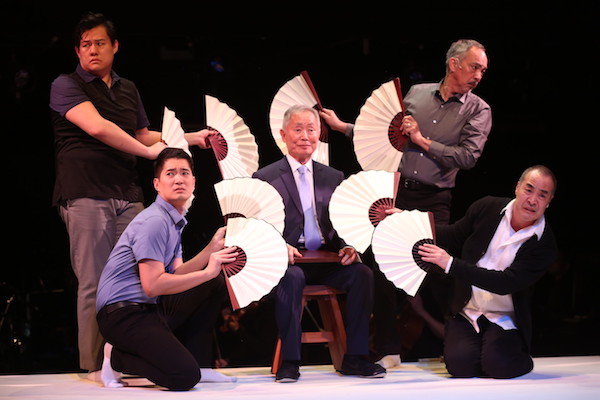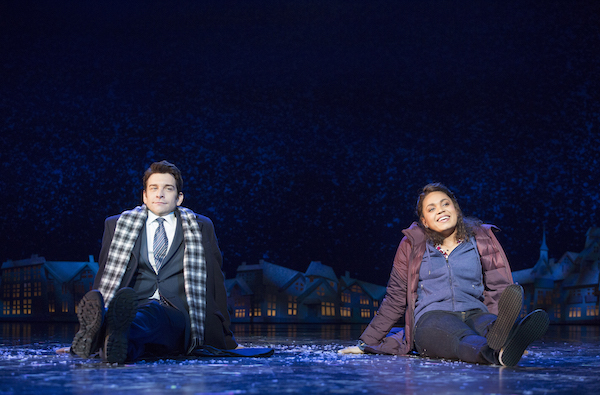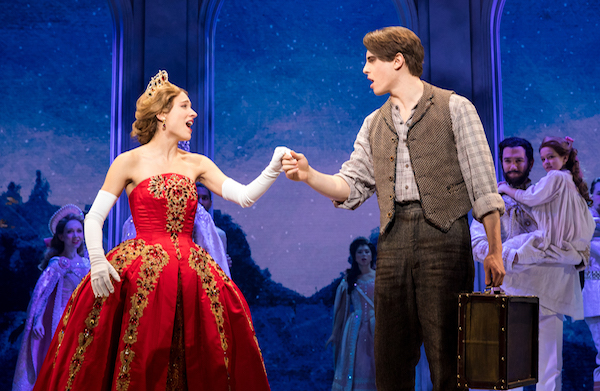
BY CHRISTOPHER BYRNE | Stripping down Sondheim is a trend this season, and theater is much better for it. On the heels of the artfully shaved “Sweeney Todd,” still packing the diminutive house at the Barrow Street Theatre, comes CSC’s comparably pared down mounting of “Pacific Overtures.” In both cases, the reductions serve the pieces extremely well and they emerge as powerful, compelling, and pretty much required viewing for anyone who admires Sondheim and loves musical theater.
In the case of “Pacific Overtures,” the show has been cut down to a taut 90 minutes without intermission. As directed and designed by John Doyle, “Pacific Overtures” is staged on a scroll that runs the length of the reconfigured theater. Using only a 10-person company, some pieces of fabric, and a few props, its focus is on the language, the music, and the story. The imposition of foreign culture on Japan beginning in 1853 and continuing to the present is chilling and, as performed in modern dress, the production reads as a bitter look back at how a culture is subsumed and largely erased, all in the quest for progress.
The score is one of Sondheim’s most complex, relying at times on the pentatonic (Japanese) scale, and the lyricism and poetry resonate of the devastation being practiced on the country. With new orchestrations by Jonathan Tunick for a smaller orchestra, every note counts — and is beautifully placed.
Three new musicals arrive for season’s end
As the plot unfolds, what is arguably one of the most sublime songs in musical theater, “Someone in a Tree,” captures the pivotal moment at which the country is basically sold down the river — and how few people could understand what was happening at the time. There are many other memorable songs, particularly “Bowler Hat,” which tells the story of the loss of Japan’s ancient soul through a few accessories — bowler hat, monocle, and pocket watch. Similarly, the arrival of representatives from other countries looking for trade in “Please Hello” is nothing short of harrowing. Each of these contributes something essential to the story and the production’s emotional impact.
The company is exceptional. George Takei is The Reciter, who sets the tale in motion and watches almost ghostlike over the events. Steven Eng is sensational as Kayama, the lowly magistrate thrust into an ever-expanding fortune, almost by accident. He sings “Bowler Hat,” and his transition takes him from meek country man to the hard, worldly man seduced by stuff and advancement, despite his wife’s suicide because of her belief he had been dishonored.
Other standouts include Kelvin Moon Loh, with an operatic bass voice and a powerful presence as the Russian Admiral, among other parts. Austin Ku, Thom Sesma, Orville Mendoza, and Mark Oka all shine. And the wonderful Ann Harada plays comedy as the pimp forced to recruit new girls. As she observes in her frustration, “With appropriate veneering, even green wood has its charms.” Harada, like the rest of the cast, plays many roles — the original Broadway company had more than 30 performers — and she shows impressive range well beyond comedy.
In an eerie echo of our own time, the cries to expel the “barbarians” and make Japan great again prove elusive and, in the end, impossible. For better or worse, one must deal with present realities, not nostalgic fantasy, even when that reality is grim.
It seems like I never see the movies inspiring musicals these days, so I upon “Groundhog Day: The Musical” as a complete tabula rasa. With a book by Danny Rubin and music and lyrics by Tim Minchin (of “Matilda”), the result is one of the most delightfully diverting shows to hit Broadway in a while.

Phil Connors, a disgruntled local weatherman has been assigned to go to Punxsutawney, Pennsylvania, to cover the groundhog. He’d rather chew glass and makes no bones about it. Stranded by a blizzard, he has to spend the night with his crew and wakes up to February 2 again and again. You can see the plot coming from as far away as Philadelphia, and Connors can’t get out of this incessant loop until he learns his lesson and becomes a nice guy. While that might sound like a nightmare for the audience as well as Connors, the bright book has a solid arc that sparkles with heart and hilarity. It’s so much fun to watch the loathsome Connors turn into a romantic leading man, even though you know that’s where it’s going.
Andy Karl’s phenomenal performance as Connors, even with his leg in a brace after an injury that forced some early performances to be canceled, is the centerpiece of this show. Since his days in “Altar Boyz,” Karl has had an unmistakable magnetism on stage, and he channels all that talent into this role.
Great as he is, he’s also got terrific material to work with. Minchin’s music and lyrics are delightfully mordant, revealing a dark worldview even when they’re bouncy, and make this a decidedly sophisticated and grown-up show.
Matthew Warchus’ direction is masterfully comic without avoiding the human side of the characters, and Peter Darling’s choreography is perfect for the tone of the show, as it was in “Matilda.”
The rest of the tireless company is top-notch, especially Barrett Doss as the fledgling producer who has to deal with Connors throughout the day’s innumerable iterations. Doss manages to be jejune and tough at the same time, and her voice is outstanding.
This is easily the happiest, most tightly crafted large-scale musical on the boards right now. I’d be happy to see it — wait for it — again and again.
Sometimes being saddled with movie adaptations can work against a musical. That’s the case with “Anastasia,” based on a 1956 live-action movie and a 1997 cartoon. For all its good intentions, the musical doesn’t know what it’s supposed to be. Is it a frothy princess tale or serious story about a woman trying to discover who she is?

For family entertainment, the assassination of Tsar Nicholas and his family during the Russian Revolution is not an easy nut to crack. Nor is the idea of Anastasia escaping death and desperately trying to reach the only living member of her family, her grandmother in Paris, the dowager empress. The deeper tale is intriguing but undeveloped. Lacking a defined focus, the show defaults to the princess-in-peril trope.
Anya, a street sweeper swirled into the identity of Anastasia by two con men, has pluck and innate style, so it’s easy to believe that she’s royalty manqué. After a long and dangerous trip to Paris, she finally meets her putative grandmother, but on the eve of being introduced as the late czar’s surviving daughter, disappears with the rakish young Dmitry who with his cohort Vlad provided the princess lessons.
This synopsis doesn’t begin to cover all the events and subplots. Terrence McNally has made a strong effort, artfully dispatching a ton of exposition in a few scenes to get to the central conflict — Anya/Anastasia wrestling with who she is, before choosing the identity she knows to be true. Or at least that’s what we presume, though we are left with a mystery that is interesting and compelling, even if it takes too long to get to.
The score with music by Stephen Flaherty and lyrics by Lynn Ahrens is tuneful, though not their best. The hit here is “Journey to the Past,” pulled from the animated version and a staple in cabarets for the past 20 years.
Directed by Darko Tresnjak, the company is solid. Christy Altomare in the title role is a strong singer and charming. Derek Lena as Dmitry is an ideal leading man and a nice match for Altomare, with skillful and dynamic singing. John Bolton, as Vlad, delivers the role with great comic timing. Mary Beth Peil, an asset to any show in which she appears, plays the dowager empress with warmth and conviction.
The sets, largely cinematic projections by Aaron Rhyne, are quite effective and may be a harbinger of a new style of technical design. They dazzle to be sure, but can make the experience distant and cold, like watching a live movie rather than something human and immediate.
This show is sumptuous, lavish, and visually dazzling, with all the markings of a crowd pleaser. But at its conclusion, “Anastasia” somehow feels disappointingly unfinished and unresolved.
PACIFIC OVERTURES | Classic Stage Company, 136 E. 13th St., btwn. Third & Fourth Aves. | Through Jun. 18: Tue.-Thu. at 7 p.m.; Fri.-Sat. at 8 p.m.; Sat.-Sun. at 3 p.m. | $71-$126 at ovationtix.com or 866-811-4111; $30 lottery on Today Tix app | Ninety mins., no intermission
GROUND HOG DAY: THE MUSICAL | August Wilson Theatre, 245 W. 52nd St. | Tue., Thu. at 7 p.m.; Wed., Fri.-Sat. at 8 p.m.; Wed., Sat. at 2 p.m.; Sun. at 3 p.m. | $79-$249 at ticketmaster.com or 800-653-8000 | Two hrs., 30 mins., with intermission
ANASTASIA | Broadhurst Theatre, 235 W. 44th St. | Tue.-Thu. at 7:30 p.m.; Fri., Sat. at 8 p.m.; Wed., Sat. at 2 p.m.; Sun. at 3 p.m. | $99-$159; telecharge.com or 212-239-6200 | Two hrs., 30 mins., with intermission

























